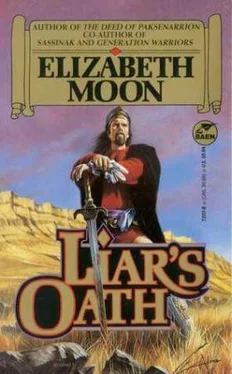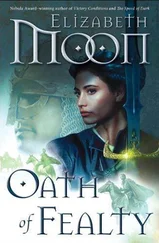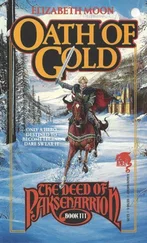Elizabeth Moon
Liar’s Oath
“Gradually it was disclosed to me that the line separating good and evil passes not through states, nor between classes, nor between political parties—but right through every human heart—and through all human hearts.”
—Alexander Solzhenitsyn,
The Gulag Archipelago
The king—Falkieri Amrothlin Artfielan Phelani, once Duke Phelan of Tsaia and now ruler of Lyonya—sat before the fire, brooding, his fingers tented together before his face. “I have heirs enough now; my lands are safe. It is time to undo the damage my folk did long years since. Time to redress old grievances, time to bring ancient enemies together in peace.”
“Are you sure this is your task?” The woman stood by the fireplace, leaning one arm on the mantel; it shadowed her face, but the firelight brought out the gleam of silver in her belt, in the hilt of a dagger at her hip, and glinted from the crescent symbol of Gird that hung from a thong around her neck. And in shadow or sun or firelight, nothing dimmed the silver circle on her brow. Paksenarrion, paladin of Gird, the king’s friend and former soldier.
“I’m sure. My grandmother, that Lady you met, said the present ruin was in part my fault—I cannot argue. And the original problem, too, comes from my ancestors.” He gestured to the table behind him, with its litter of scrolls and books. “The Pargunese, in their rough way, have the right of it: they were free Seafolk, whom my ancestors sought to enslave—”
“As they had enslaved the Dzordanyans?”
“Perhaps. I don’t know that, but I do know—I am sure—that the Old Aareans routed the Seafolk from their homes. They came here, to the Honnorgat valley, and settled the north shore of the river as far up as they could sail or row—and then found themselves faced with the Aareans again, moving north from Aarenis.”
“A long time ago,” said Paksenarrion, frowning.
“Very long, for humans.” The king smiled briefly. He himself looked no older than she, though in truth he could have been her father; he had not seemed to age for a score of years. He would live as long again, or more: his elven mother’s inheritance. “But when I asked my lady grandmother, she confirmed the Pargunese account. They sailed upriver; the Tsaians and human Lyonyans came over the mountains. And a few have memories of complaints made then, and wars begun then. The Pargunese and Kostandanyans have quarreled with Tsaians and Lyonyans as long as any human remembers. And now with Sofi Ganarrion’s heirs loose in Aarenis, with Fallo and Andressat at odds—”
“Not all that is your fault,” Paksenarrion said. She moved to the chair across the firelight from him and sat down. “Surely you know that.”
“As I know what is my fault,” he said. “A king must never excuse himself. Gird would say that.”
“Gird did,” she said wryly, with a grin. “But how will you proceed?”
He stared at the fire, as if it had answers to give. “I must find some way to convince the southerners that I do represent Old Aare as well as the north. You remember Andressat: those old lords believe no northern title. If it were possible to find some buried talisman, some ancient relic . . .”
“Is a sword worth more than a swordsman?” Paksenarrion rested in her chair as if weightless; no hawk ever had more vigilant eyes.
“No, but I’m not likely to find a convenient army of Aareans ensorceled for an age, ready to my command—” He stopped abruptly; she had held up her hand. Her face seemed closed a moment, then she grinned as happily as the young girl he remembered.
“Are you not? Can you doubt the gods’ influence, sir king, in asking me here?”
“I would never doubt the gods where you’re concerned, but what—?”
“Kolobia,” she said, Kolobia. His breath caught in his throat. Where she had been captured by iynisin, the elves’ cruel cousins who hated all living things, who corrupted the very stone by dwelling in it. Where she had lost what made her what she was, a paladin of Gird . . . he thought of what she had gone through to regain it and winced away from the memory. She shook her head, impatient with his sentiment. “Kolobia,” she said again, joyfully. “Luap’s Stronghold—the sleeping knights there—”
“But you told me they waited some god’s call to wake—”
“So Amberion said, when we found them. But as you know the Marshal-Generals have sent scholars there to read through their archives; they have not shared all they learned abroad. Those were not Gird’s closest followers, as we first thought, but mageborn, descendents of those lords against which Gird fought. And in their own time, they believed themselves descended from the lords of Old Aare.”
“Were they?” he asked.
She shrugged. “How can we know? We know what they said of themselves in their records, but not if they spoke truth—or even knew it.”
“And you think I should try to wake them?”
“I think you should ask the gods, and possibly your elven relatives. The scholars found as many mysteries as answers; they are not sure why the stronghold was founded, or why an end came—even what the end was. The records end abruptly, as if it came suddenly, or as if the writers expected no one to read their words again.”
The king stood and paced the length of the room without speaking. Then he came back to the table, and leaned on it, as if reading the maps and books thereon. She watched him, silent.
“I know the way,” he said finally. “I know, and cannot tell you, how to wake the sleepers . . . but without knowing why they sleep, and if some great power intended another awakening for them, dare I intrude?”
“The gods will tell you, if you listen,” she said. He grunted; she always said that, and for her it was true: she listened, and the gods guided her. That was the essence of a paladin. For himself, it was more of a struggle. A king could not merely follow; a king had to understand. She had said more than once that paladins were not meant to govern.
“And what of the iynisin in Kolobia?” he asked. “If I waken the sleepers, what about them?”
A shadow crossed her face, as well it might. “Sir king, if you could persuade your elven relatives to explain more of the iynisin presence there it would help us all. In all the records from Luap’s time, there is no mention of iynisin, and only one or two comments of some mysterious danger. The neighboring kingdom was said to believe that demons of some kind lived in the canyons before Luap came. Perhaps they thought iynisin were demons, but that doesn’t explain why Luap and his folk never saw them.”
“It would help,” the king said, “if we knew more about Luap himself: who he was, and why he journeyed there, and what he thought he was doing.”
Fin Panir in summer could be as hot as it was cold in winter; every window and door in the old palace complex stood wide open. Luap had started work early, before the heat slicked his hands with sweat to stain the parchment. Now, in midmorning, the heat carried ripe city smells through his broad office window. He paused to stretch and ease his cramped shoulders. For once Gird had not interrupted him a dozen times; he had finished a fair copy of the entire Ten Fingers of the Code . He reached for the jug of water and poured himself a mug, carefully away from his work. Could he write another page without smudges, or should he quit until evening’s cool? He wondered, idly, why he had heard nothing from Gird that morning, and then remembered that a Marshal from a distant grange had come to visit. Doubtless they were still telling stories of the war.
Читать дальше












